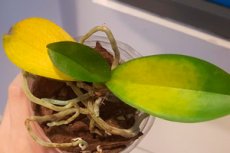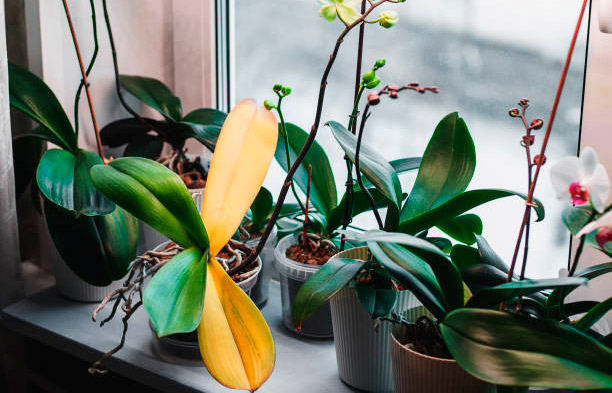Yellowing orchids
Last reviewed: 11.03.2025

Yellowing in orchids is a common issue that many plant enthusiasts encounter. While orchids are known for their exotic beauty, they can also be quite sensitive to changes in their environment. When an orchid turns yellow, it is often a sign of stress or improper care. In this article, we will explore the various reasons why orchids turn yellow, what can be done to address the problem, and how to prevent it in the future.
Why do orchids turn yellow?
Why does an orchid turn yellow? There are several factors that can lead to yellowing leaves in orchids. Understanding these factors is crucial for maintaining the health of your orchid. Here are some of the most common reasons:
- Overwatering: one of the main reasons why orchids turn yellow is overwatering. Orchids have very sensitive roots, and when they sit in waterlogged soil for too long, they can start to rot. The roots lose their ability to absorb nutrients, causing the leaves to turn yellow and eventually die.
- Underwatering: yellowing leaves in orchids can also be a result of underwatering. When an orchid doesn’t get enough water, its leaves may start to yellow, dry out, and eventually fall off.
- Improper light exposure: orchids in home conditions with yellowing leaves can often be traced back to light issues. Orchids need bright but indirect sunlight. If they receive too much direct sunlight, their leaves can burn and start to yellow. On the other hand, insufficient light can lead to yellowing leaves due to a lack of energy for growth.
- Nutrient deficiency: another reason why orchid leaves turn yellow is a lack of essential nutrients. Orchids require a balanced supply of nitrogen, phosphorus, and potassium. Without these nutrients, their leaves can turn yellow.
- Aging leaves: sometimes, orchid leaves turn yellow as part of the natural aging process. Lower leaves on an orchid turn yellow and fall off to make way for new growth. This is a normal occurrence and generally not a cause for concern.

What to do if your orchid is turning yellow?
If you notice that your orchid is turning yellow, it is important to act quickly to identify the cause and take appropriate action. Here are some steps to consider:
- Adjust watering routine: if your orchid's leaves are turning yellow due to overwatering, allow the potting medium to dry out completely before watering again. Always ensure that your orchid’s pot has proper drainage to avoid waterlogged roots. If underwatering is the issue, increase the frequency of watering while being careful not to overdo it.
- Regulate light conditions: for orchids that are yellowing due to light issues, make sure they are getting adequate indirect sunlight. If the orchid is placed in direct sunlight, consider moving it to a spot where it will get bright but filtered light. Conversely, if the plant is not receiving enough light, move it to a brighter location.
- Fertilize properly: if orchid leaves are yellowing due to nutrient deficiency, use a balanced orchid fertilizer to restore the necessary nutrients. Make sure to follow the instructions on the fertilizer packaging to avoid over-fertilizing, which can also cause yellowing.
- Check for root health: sometimes yellowing orchid leaves can indicate root rot. Remove the orchid from its pot and inspect the roots. Healthy roots should be white or green and firm. If the roots are yellow or brown and mushy, trim away the damaged areas and repot the orchid in fresh orchid mix.
Common problems related to yellowing in orchids
Orchid leaves turning yellow is not the only issue you may encounter. Here are some related problems and their solutions:
- Yellowing and dropping leaves: if orchid leaves turn yellow and drop, it could be a sign of severe stress, possibly due to root rot or pest infestations. Carefully inspect the plant and treat any underlying issues.
- Yellowing at the base: if the base of the orchid is turning yellow, it could be due to a fungal or bacterial infection. Remove the affected parts of the plant and apply an appropriate fungicide or bactericide.
- Yellowing flower buds: when orchid buds turn yellow before blooming, this is known as bud blast. It can be caused by sudden changes in temperature, drafts, or inconsistent watering. Ensure that your orchid is kept in stable conditions to prevent bud blast.
Why do orchid leaves turn yellow at the bottom?
Why do the lower leaves of an orchid turn yellow? Lower leaves naturally yellow and fall off as part of the plant’s growth cycle. However, if multiple leaves are turning yellow simultaneously, it could be an indicator of improper watering, light, or a nutrient issue.
How to prevent yellowing in orchids
Preventing yellowing in orchids requires proper care and attention to their unique needs. Here are some preventive measures:
- Follow a consistent watering schedule: orchids do not like to be too wet or too dry. Water the plant only when the top inch of the potting medium feels dry to the touch.
- Provide adequate humidity: orchids thrive in environments with high humidity. Maintain a humidity level of 50-70% around your orchid to keep it healthy and prevent yellowing.
- Use the right potting mix: orchids need a well-draining potting mix, such as bark or sphagnum moss, to ensure proper aeration and prevent root rot.
- Monitor light exposure: ensure your orchid gets plenty of bright, indirect light. Avoid placing it in direct sunlight, as this can burn the leaves.
Conclusion
Yellowing in orchids is often a sign that the plant is under stress, either from improper care or environmental factors. By understanding the causes of yellowing orchid leaves, you can take steps to address the problem and restore your orchid to health. Whether it's adjusting the watering routine, providing better light, or ensuring the plant gets adequate nutrients, proper care is key to preventing yellowing.
Remember, yellowing leaves on orchids can sometimes be a natural part of the plant’s lifecycle, especially when it comes to lower leaves. However, when multiple leaves start to yellow, it’s crucial to identify the cause and act accordingly. With the right care and attention, your orchid can thrive and continue to bring beauty to your home for many years to come.
